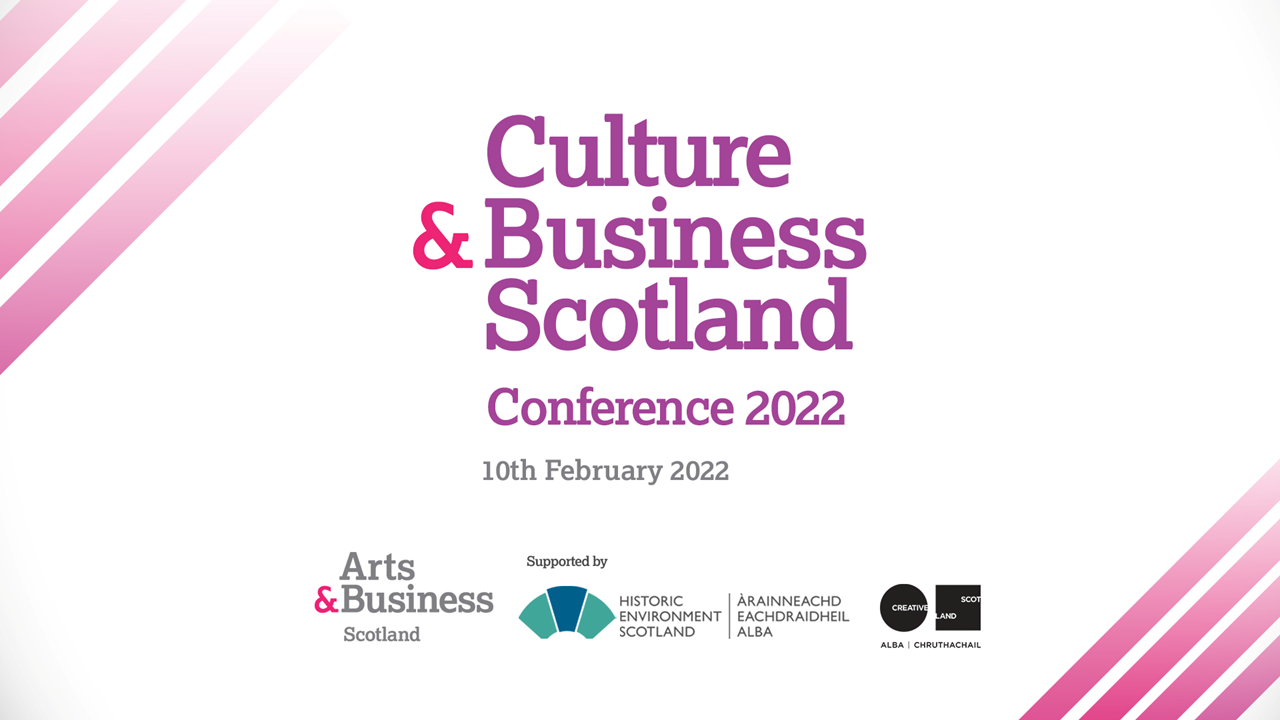On 10 February 2022 Arts & Business Scotland hosted a major event: The Culture and Business Scotland Conference.
This event brought the business, public, and culture sectors together to discuss how engaging with creativity and culture can be the key to not simply surviving but thriving in the face of key collective universal challenges.
The event placed an emphasis on presenting things from a business and public sector perspective, to help better understand the value of and return on establishing partnerships with the culture sector. This includes how engaging with culture can deal with the impacts of covid-19, address environmental sustainability, and manage staff wellbeing, engagement and retention.
Keynote speakers were Chris van der Kuyl CBE FRSE, Chairman of 4J Studios (best known for developing Minecraft for Microsoft, Sony and Nintendo games consoles), Jo Macsween, formally from Macsween Haggis and now prominent leadership coach, and Benny Higgins FRSE, Executive Chairman of the Buccleuch Group, Chairman of the National Galleries of Scotland & The Edinburgh Fringe Society, and more.
Arts & Business CEO David Watt provides his reflections on this major event – which had close to 500 registrations:
What we have heard and seen at the Culture and Business Scotland Conference has been enlightening, thought provoking and, presented some exciting collaborative ideas to help us rise to collective social and economic challenges. There are many takeaways for us to reflect upon.
Chris van der Kuyl stressing that creativity is vital to the success of all businesses; that it is a key skill and attribute that we should nurture in our people and that culture has a vital role in a thriving and innovative economy.
Benny Higgins endorsing the importance of the creative and culture sector as a key partner for the business and public sectors to enable social and economic recovery as set out in the report to Scottish Government ‘Towards a Robust, Resilient Wellbeing Economy’
And how inspiring to hear a first-hand example of a business putting theory into practice, when Jo Macsween shared her bold approach to business development. Who would have thought that employing a storyteller to work with staff would be key to cultivating committed and engaged employees? Truly innovative and inspirational leadership!
Louise Macdonald and Sean McGrath were both clear that we need dynamic, open, forward-thinking leaders to steer business and public sector organisations through our collective challenges. The importance of embedding equalities, diversity, and inclusion within the culture of a business, and how innovative leaders should employ cultural engagement to achieve that aim.
Evolving the culture within businesses was also referenced by Sean McGrath, when he unpacked the importance of ESG (Environmental, Social, and Governance) targets for business. How better to account against these considerations and measures, than through partnerships with culture to address sustainability and equalities agendas.
Peter Griffiths from Calmac shared business drivers for working with culture – providing rich cultural experiences for communities, where staff live and work. But also recognising the value of providing rich experiences for those journeying on their ferries to cultural events – the spend by these cultural tourists making a significant impact on the rural economy.
Stuart Patrick was insightful about the importance of culture to the urban economy and its key role in the regeneration of post-industrial Glasgow. Cultural skills and assets will also be key to avoiding empty shopping streets and disconnected communities. But also, culture can contribute to reimagining the future of inner city working and office environments to make them more dynamic to drive creativity in business.
Jo Macsween used cultural engagement to change the culture within her business – the attitude and actions of employees. There are clear parallels, when James Whiteman at Aviva Investors worked with David Nelson at Scottish Chamber Orchestra to commission ‘Symbiosis’ – a breathtakingly beautiful performance that helped to bring home the importance of responding to the climate emergency challenge with the workplace. This clearly connects with staff, customers, and stakeholders on a more emotional level, and aligns with Sean McGrath’s message about the importance of embedding ESG within the DNA of businesses.
It was fantastic to hear from Marije Plaum at the Rijksmuseum about their partnership with Philips with a focus on innovation to drive commercial market opportunities. This also provides societal benefits – technology that enhances patient experiences and provides medical professionals with more accurate patient analysis. Again, a truly moving and inspiring presentation.
It is interesting to reflect upon what the World Economic Forum, in 2021 considered to be the essential top 10 job skills of tomorrow. Critical thinking and problem solving topped the list. Creativity and originality also prominent, and self-management skills such as active learning, and flexibility are identified for the first time.
The creative, culture and heritage sectors are innately adaptive, and responsive to challenges and opportunities and have inherent attributes to provide solutions to support these business needs.
So, how inspiring to hear from Kirsten Cockburn, Catherine Cassidy and Rhiana Laws at Scottish Ballet and participate in their workshop, to understand how they proactively adapted during the pandemic, and creatively repurposed their digital and physical assets – supporting physical and mental health & wellbeing in partnership with the NHS, but now adapting this to provide corporate partners with solutions for staff wellbeing, and engagement to counter homeworking challenges.
We want what we have shared at this event to be a catalyst for encouraging and enabling even greater partnership working to help address collective challenges and fully harness opportunities. To support this we are launching a business and public sector facing survey that will test appetite and need for greater or expanded opportunities for collaboration.
James Law Associates will gather data and capture opinions, to inform the development of a new marketplace that will provide a centralised resource of creative solutions to address business challenges and needs.
If you want to register your interest to take part in this survey, please complete this form, after which James Law Research Associate will be in touch directly. We thank you in advance for your input.
On behalf of Arts & Business Scotland I’d to thank all our speakers, presenters, and panellist for their insightful and informed contributions.




